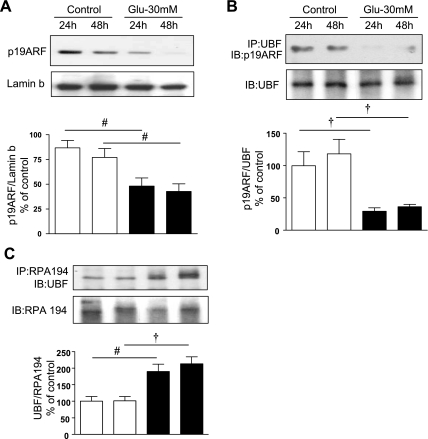Fig. 4.
A: high glucose induces loss of p19ARF in nuclear compartment. GEC were treated as described in Fig 2. Immunoblotting (IB) with antibody against p19ARF showed that high glucose reduced the nuclear content of p19ARF, a UBF1-associated protein, at 24 and 48 h. B and C: high glucose dissociates UBF-p19ARF complex and promotes association of UBF with RPA194 of Pol I. Equal amounts of protein (200 μg) from nuclear extracts immunoprecipitated (IP) with UBF1 antibody (B) or RPA194 antibody (C) were separated by SDS-PAGE and immunoblotted with an anti-p19ARF antibody or with an anti-UBF1 antibody, respectively. Immunoblotting with UBF1 and RPA194 antibodies was performed to assess loading (B and C, top). Note that high glucose augmented UBF-p19ARF dissociation and UBF-RPA194 association in the nucleus. Histograms represent means ± SE from 4 independent experiments. Significant differences between control and high-glucose-treated cells are indicated by #P < 0.05 and †P < 0.01 by ANOVA.

